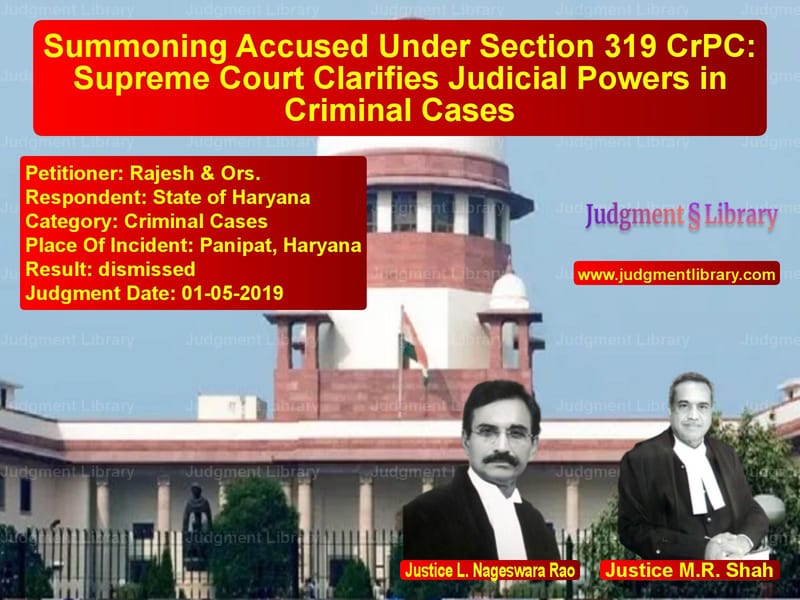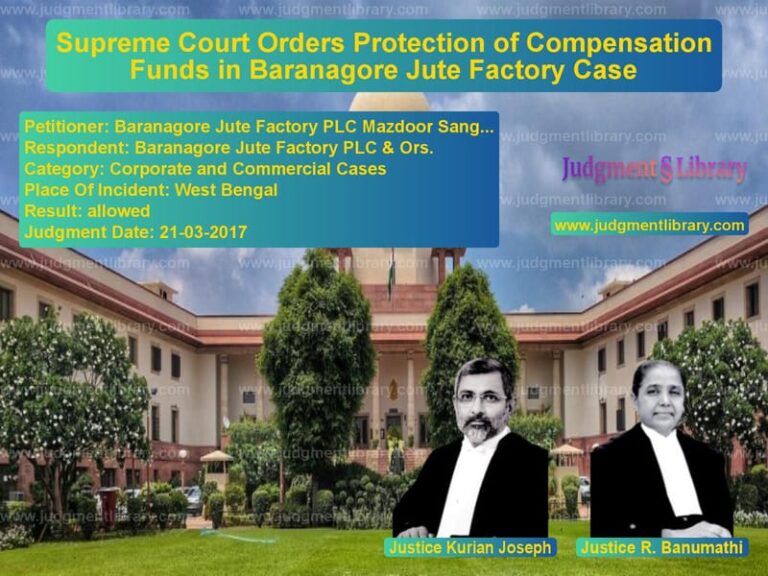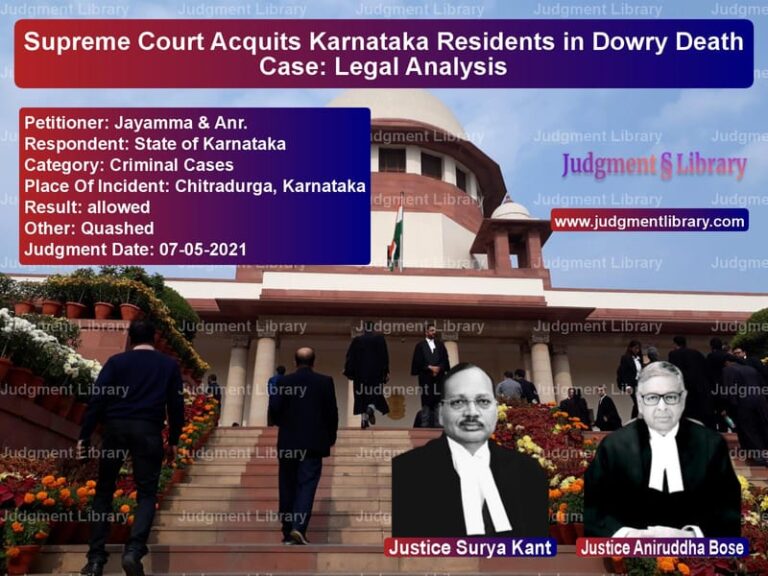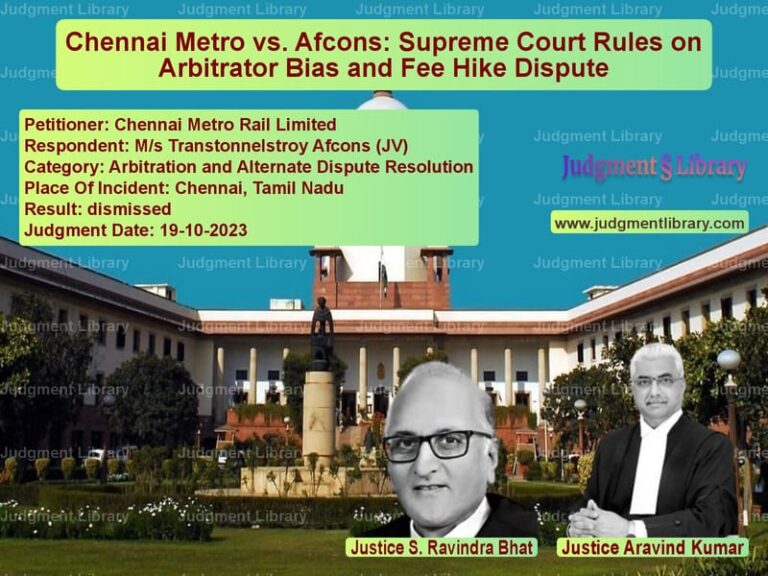Summoning Accused Under Section 319 CrPC: Supreme Court Clarifies Judicial Powers in Criminal Cases
The case of Rajesh & Ors. vs. State of Haryana revolves around the invocation of Section 319 of the Code of Criminal Procedure (CrPC), which allows courts to summon additional accused during the trial. The Supreme Court examined whether the Trial Court was justified in summoning the appellants as additional accused despite the police initially not filing a charge sheet against them.
The appellants were originally named in the FIR but were not included in the charge sheet filed by the police. However, during the trial, key prosecution witnesses testified that the appellants were actively involved in the crime. Based on this testimony, the Trial Court summoned the appellants to face trial under Section 319 of the CrPC. The High Court upheld this order, leading to an appeal before the Supreme Court.
Background of the Case
The case originated from an incident that occurred on June 12, 2016, in Panipat, Haryana. The complainant, Hukum Singh, filed FIR No. 180, accusing multiple individuals, including the appellants, of attacking his son Bhajji and another individual, Hari. The accused were allegedly armed with swords, pistols, hockey sticks, iron bars, and other weapons.
The police investigated the case and filed a charge sheet against four individuals while excluding the appellants, stating that they were not present at the scene of the crime. The Trial Court began proceedings against the charge-sheeted individuals.
Petitioner’s Arguments
Senior Advocate Shri R. Basant, representing the appellants, argued:
- The Trial Court erred in summoning the appellants under Section 319 of the CrPC.
- Section 319 is an extraordinary power that should be exercised sparingly and only in exceptional cases.
- The police had already investigated and found no evidence against the appellants, confirming their absence from the crime scene.
- The prosecution witnesses’ testimonies were not new evidence but merely reiterated statements made to the police.
- Invoking Section 319 solely on examination-in-chief testimony, without cross-examination, was procedurally incorrect.
- The High Court failed to consider that the appellants had been discharged earlier and could not be re-summoned without compelling new evidence.
Respondent’s Arguments
The State of Haryana, represented by counsel, countered:
- The appellants were named in the FIR, and key witnesses explicitly stated in court that they were involved in the crime.
- The discharge of the appellants was not a formal discharge order under Section 227 or 239 CrPC but only a release from custody.
- The Trial Court had the authority to summon the appellants under Section 319 based on witness testimony in court.
- The complainant was never given an opportunity to challenge the police’s decision not to charge the appellants.
- As per Supreme Court precedent, even if a person was not charge-sheeted, they could still be summoned if evidence presented during trial indicated their involvement.
Supreme Court’s Analysis
The Supreme Court thoroughly examined the powers granted under Section 319 of the CrPC. The key points from the ruling were:
- Section 319 CrPC allows courts to summon any person as an accused if evidence presented during trial suggests their involvement.
- The term “evidence” under Section 319 includes statements made during examination-in-chief and is not limited to cross-examined testimony.
- The power to summon an accused under Section 319 is discretionary and should be used sparingly but effectively to prevent guilty individuals from evading justice.
- The fact that the police did not charge the appellants did not prevent the Trial Court from summoning them if evidence emerged later.
- The witnesses’ depositions before the Trial Court were credible and contained direct allegations against the appellants.
- The appellants’ discharge from custody was not a judicial determination of their innocence but a procedural step.
Key Judicial Findings
The Supreme Court ruled:
- The Trial Court correctly exercised its power under Section 319 CrPC.
- The evidence provided by prosecution witnesses was sufficient to justify summoning the appellants.
- The High Court’s decision to uphold the Trial Court’s order was legally sound.
- The appeal by the appellants was dismissed, and they were ordered to face trial.
Conclusion and Impact
The Supreme Court’s ruling reaffirms the judiciary’s power to ensure that all culpable individuals face trial, even if they were not originally charge-sheeted. This judgment underscores that the courts are not bound by police investigations and can independently determine whether additional individuals should be tried based on evidence presented during the trial.
The decision strengthens the application of Section 319 CrPC and provides clarity on the judicial discretion involved in summoning additional accused, ensuring that justice is not denied due to procedural lapses or investigative omissions.
Petitioner Name: Rajesh & Ors..Respondent Name: State of Haryana.Judgment By: Justice L. Nageswara Rao, Justice M.R. Shah.Place Of Incident: Panipat, Haryana.Judgment Date: 01-05-2019.
Don’t miss out on the full details! Download the complete judgment in PDF format below and gain valuable insights instantly!
Download Judgment: Rajesh & Ors. vs State of Haryana Supreme Court of India Judgment Dated 01-05-2019.pdf
Direct Downlaod Judgment: Direct downlaod this Judgment
See all petitions in Bail and Anticipatory Bail
See all petitions in Attempt to Murder Cases
See all petitions in Judgment by L. Nageswara Rao
See all petitions in Judgment by Mukeshkumar Rasikbhai Shah
See all petitions in dismissed
See all petitions in supreme court of India judgments May 2019
See all petitions in 2019 judgments
See all posts in Criminal Cases Category
See all allowed petitions in Criminal Cases Category
See all Dismissed petitions in Criminal Cases Category
See all partially allowed petitions in Criminal Cases Category







